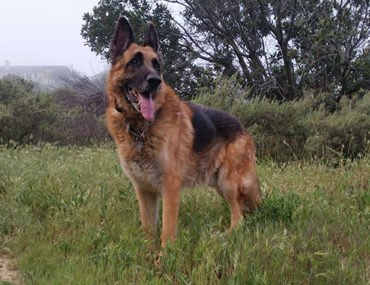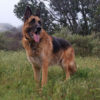The German Shepherd Dog is an amazing companion dog. German Shepherd Dogs are versatile in ability and gentle in nature. They are considered highly intelligent, loyal, protective, and bond well with people. You can find many reports of German Shepherd Dogs instinctively protecting children or adults in emergencies. In none of those cases were the dogs trained to do so.
German Shepherd Dogs are happiest when they live inside the home and are part of the family. They enjoy leading an active lifestyle, including long walks, runs or hikes.
German Shepherd Dogs make amazing family dogs for the right home but their intelligence and high energy can cause much frustration if they are not stimulated sufficiently. Is a German Shepherd Dog right for your family? Read on.
A Brief History
The German Shepherd Dog originated in 1899 in Germany. Max von Stephanitz, an ex-cavalry captain and former student of the Berlin Veterinary College is considered the father of the German Shepherd Dog breed. It is the only dog breed with the word “dog” in its name. Many abbreviate the German Shepherd Dog to German Shepherd or also GSD.
German Shepherd Dogs are part of the herding group and considered working dogs. German Shepherd Dogs are known for their strength, intelligence, trainability, unshockability, and obedience. They are the preferred dog breed for a wide variety of tasks including, disability assistance, police and military work, scent detection, search-and-rescue, and protection dog sports.
Health Considerations
The German Shepherd Dog is supposed to be bread for strength and working ability and many breeders in Europe still adhere to this philosophy. Unfortunately, too many breeders in the United States have focused more on the beauty of the dogs and in the process of ignoring health, introduced a variety of health concerns that were less common in the past. Poor genetics in this amazing breed has become a real concern in the last 30+ years. This should not dissuade you from having a German Shepherd Dog in your family but it’s something to keep in mind.
When buying a dog from a breeder you can eliminate many genetic issues by selecting a responsible breeder or buying a dog imported from Europe. When you rescue from a shelter or rescue organization, that is not possible. This is not an argument against rescue. For most families, I believe that is the best option. I have rescued many dogs from shelters and three of my own rescues are 100% pure-bred German Shepherd Dogs, from local shelters. Your dog will need training, no matter where you get him/her. With a nice 3-year-old, you can skip a lot of puppy stress.
The most common health risks to look for are hip/elbow dysplasia (leads to arthritis), degenerative myelopathy (neurological spinal cord disease) and pancreatic diseases.
Fortunately, it has become very inexpensive to perform comprehensive genetic health tests on dogs. My personal favorite is EmBarkVet, which now includes 170+ genetic health checks. Buying pet insurance is also a good way to prepare yourself for any health risk in your German Shepherd Dog, genetic or accidents. The pet insurance I use is Embrace. Many of my clients also use Healthy Paws.
Socialization and Training
you want to or not. It doesn’t matter if your dog is seven weeks or seven years old. Your dog is watching and learning; teach the right lessons. Start training the moment your dog comes home. Don’t wait. Too many people get a puppy and then waste the first couple of months. Especially with a puppy, you want to take advantage of the critical development period up to month four of age. Take your German Shepherd Dog to as many new environments as possible. Let your dog play with as many healthy dogs as possible. Have as many good people interactions as possible. Just avoid the dog park. Have friends and neighbors with healthy dogs come over for play dates. Socialize your German Shepherd Dog early on and you will have a social, friendly dog for the rest of their life. Strike a healthy balance with active socialization and being careful until puppy vaccinations are complete. Isolation and seclusion are not your friends. Consider a holistic veterinarian for more responsible vaccination schedules, which can often be completed earlier.
German Shepherd Dogs are highly intelligent. Train daily and engage their mind. It builds a strong bond and keeps them out of trouble. Intelligent dogs can get bored more easily and if you don’t teach them things, they may find their own entertainment. It may be eating the sprinkler heads or hopping the fence to explore the neighborhood. Not the best ideas. If you keep your dog mentally stimulated with fun activities, toys and games, your German Shepherd Dog will be happier.
Size Matters
German Shepherd Dogs are bigger. Males stand 24-26 inches tall and females 22-24 inches. Males weigh 66-88 lbs and females 49-73 lbs. If you live in a small apartment it may get a bit crowded. More space is better, but as long as your dog is trained and socialized well and you are meeting your dog’s biological needs, mentally and physically, space is secondary. If you live with your dog correctly, even an apartment is okay for a German Shepherd Dog.
Grooming
German Shepherd Dogs shed once a year – for 365 days. Get ready for a lot of fur, they shed year-round. You will have fur everywhere. If that bothers you, a German Shepherd Dog is not a good choice. However, you can reduce the in-home fur distribution significantly with daily brushing. You will need a brush that removes the loose undercoat. I use a FURminator and feel that is the best brush to use. Regular grooming is a must. I brush, nail trim and bathe my German Shepherd Dogs myself but it’s a lot of work and groomers can help.
Children
German Shepherd Dogs are amazing with children if they are introduced correctly or grow up together. However, this is a two-way street. Just as you have to show your German Shepherd Dog initially how to interact with your child, you have to teach your child how to interact with your dog. It is not realistic to have a child torment a dog with poking and pulling and expect that dog to never react. Only if you start them off correctly, will it become a beautiful relationship.
In conclusion, German Shepherd Dogs are amazing companions and the best family dog you can ever have, as long as you fulfill their needs as well.










